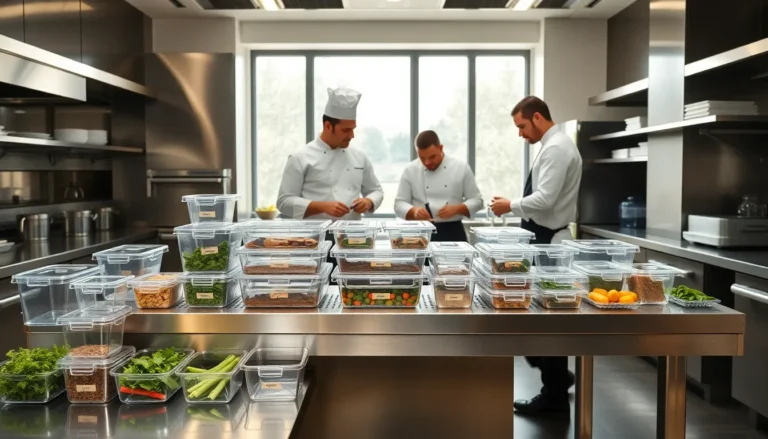In a world overflowing with culinary choices, the art of Epicurean evaluations stands as a beacon for food lovers everywhere. Imagine savoring every bite while simultaneously dissecting flavors like a seasoned critic—sounds delightful, right? This isn’t just about eating; it’s about experiencing food in a way that tickles the taste buds and ignites the imagination.
Table of Contents
ToggleUnderstanding Epicurean Evaluations
Epicurean evaluations focus on the pleasure of food and drink, emphasizing a thoughtful approach to tasting. This method enriches the culinary journey, allowing enthusiasts to appreciate tastes more deeply.
Definition of Epicurean Evaluations
Epicurean evaluations refer to the systematic assessment of flavors, textures, and aromas in food. It prioritizes sensory experiences, which cultivates a deeper understanding of dishes. The practice encourages individuals to analyze culinary elements such as balance, complexity, and presentation. This evaluation method transcends mere consumption, transforming eating into an art of discovery and appreciation.
Historical Context
Epicurean evaluations trace back to ancient Greek philosophy, specifically the teachings of Epicurus. He advocated for pleasure as a guiding principle in life, particularly through enjoyment of food. Over time, this philosophy evolved, intertwining with various culinary traditions around the globe. The Renaissance era saw a surge in gourmet dining, reflecting deeper appreciation for culinary arts. Throughout history, notable chefs and writers, like Auguste Escoffier and Julia Child, further promoted this thoughtful evaluation of food.
The Importance of Epicurean Evaluations

Epicurean evaluations play a crucial role in enhancing the culinary experience. They foster a deeper appreciation for food and drink by promoting critical tasting and enjoyment.
Impact on Culinary Arts
Culinary arts benefit immensely from Epicurean evaluations. Chefs refine techniques and presentations through detailed sensory assessments, focusing on flavors, textures, and aromas. Creativity flourishes as culinary professionals seek balance and complexity in their dishes. Understanding patrons’ preferences allows chefs to tailor menus that cater to diverse tastes. Historical influences, particularly from Epicurus, continue to inspire culinary innovation. Chefs incorporate the philosophy and engage more meaningfully with their craft.
Influence on Customer Experience
Customer experience transforms significantly due to Epicurean evaluations. Diners engage with food on a sensory level, leading to more memorable meals. Thoughtful evaluations create a dining atmosphere that emphasizes appreciation. Restaurant staff trained in these assessments may enhance interactions with patrons, enabling them to convey details of each dish enthusiastically. Personal connections to food invite guests to explore new tastes and share experiences, ultimately adding value to the overall dining journey. Enhanced customer satisfaction often results from this engaging approach, encouraging repeat visits and word-of-mouth referrals.
Methods of Conducting Epicurean Evaluations
Epicurean evaluations employ various methods that enhance the culinary experience and foster appreciation for food. These methods include sensory analysis techniques and consumer feedback mechanisms.
Sensory Analysis Techniques
Sensory analysis involves systematically examining flavors, textures, and aromas. Evaluators utilize specific criteria to assess attributes such as sweetness, acidity, and savoriness. Professional panels or individual tasters often conduct these analyses in controlled environments. Additionally, standardized tasting protocols help ensure consistency and reliability. Characteristics like mouthfeel and aroma intensity also receive attention. Participants note their impressions, creating comprehensive profiles for each dish. This detailed feedback allows chefs to refine recipes, enhancing overall quality and satisfaction.
Consumer Feedback Mechanisms
Consumer feedback plays a pivotal role in Epicurean evaluations. Restaurants and culinary creators often gather insights from diners to understand their preferences. Surveys and comment cards provide structured opportunities for patrons to share experiences. Digital platforms, such as social media and review sites, expand reach and immediacy of feedback. Insights obtained from feedback help chefs and restaurateurs adjust flavors, presentation, or service. Understanding customer sentiment aids in crafting tailored menus that resonate with diverse tastes. Continuous engagement fosters loyalty, ensuring customers feel valued and heard.
Case Studies of Epicurean Evaluations
Exploring real-world applications of Epicurean evaluations uncovers valuable insights into their effectiveness in enhancing the culinary experience.
Successful Implementations
Several restaurants effectively implement Epicurean evaluations, leading to remarkable improvements in dishes. One establishment adopted a structured sensory analysis approach, assessing flavors and textures before launching new menu items. This method resulted in a 20% increase in customer satisfaction scores. Another notable case saw a chef create a seasonal tasting menu that emphasized local ingredients. Feedback from diners focused on the balance of flavors, prompting the chef to refine recipes continuously. These examples show how applying Epicurean evaluations fosters creativity and customer engagement, driving restaurants toward culinary excellence.
Lessons Learned
Valuable lessons emerge from these Epicurean evaluations. First, engaging customers in the feedback process creates a sense of ownership over the dining experience. Establishments that actively solicit and incorporate feedback tend to see higher repeat visits. Additionally, systematic sensory analysis cultivates an environment where chefs can innovate while remaining attuned to customer preferences. Establishments that neglect regular evaluations may struggle with menu fatigue, where dishes fail to excite patrons. Emphasizing thoughtful evaluation not only enhances flavors but also builds lasting connections between diners and culinary creators.
Epicurean evaluations offer a transformative approach to the culinary experience. By prioritizing sensory analysis and critical tasting, food enthusiasts can deepen their appreciation for flavors and textures. This method not only enhances personal enjoyment but also fosters creativity among chefs, leading to innovative dishes that resonate with diners.
Restaurants that embrace this philosophy create memorable dining experiences, encouraging customer loyalty and satisfaction. The integration of consumer feedback ensures that menus remain dynamic and engaging. Ultimately, Epicurean evaluations cultivate a rich connection between diners and the culinary arts, turning each meal into an opportunity for exploration and delight.



